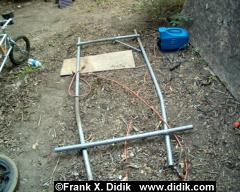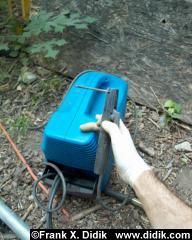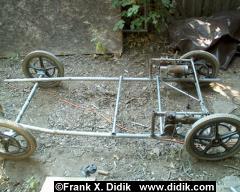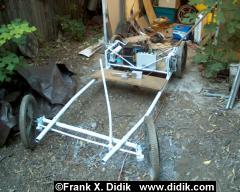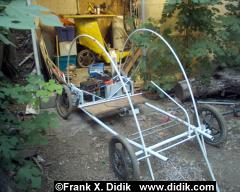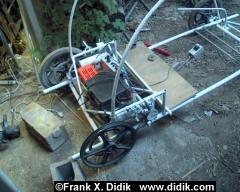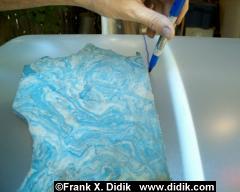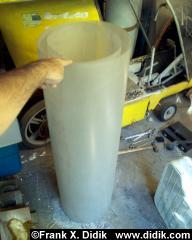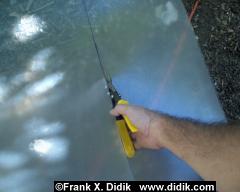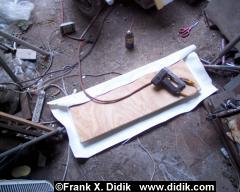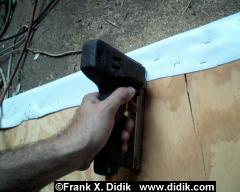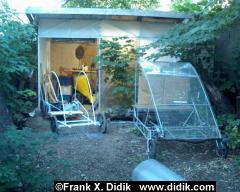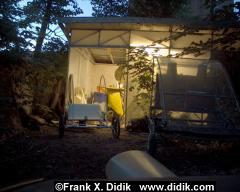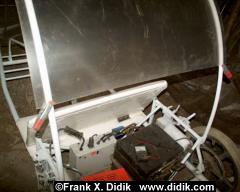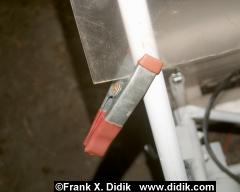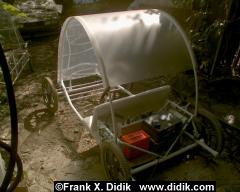|
Didik
Turtle
How to
build a two person electric vehicle in 14 hours!
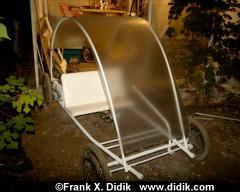
The Didik Turtle is probably a vehicle that should not have
been built since it does not incorporate any particularly new
technological features. The vehicle was designed and built in just 14
hours, with the intention of being used at Ecofest 2005, in New York
City. The original concept was to allow attendees to actually drive
the vehicle around a closed loop, though this did not happen.
The vehicle, is powered by two 1.25HP motors on the rear
wheels and can carry two people with a top speed limited to 28mph
(just under 50km/hour) with a range of 25miles. The vehicle was built
with simplicity and speed of construction in mind and does not
incorporate any suspension system, other than the cushioning effect
of the seat and the inflatable tires. Rather than a complex steering
system and geometry, the steering is controlled by a tiller bar. The
tire rod ends are nothing more than heavy duty hinges. The vehicle is
essentially consists of a welded and bolted light weight tubular
steel frame. The roof/canopy tubes are actually 3/4" PVC plastic
tubes that fit snugly (and are glued with silicon caulking) into
steel guide tubes. The plastic canopy is extremely thin and
lightweight, and was affixed to the PVC tubes again with white
silicone caulking. Surprisingly, the combination steel/PVC tubing
created a rather strong and for the most part, non-flexing body. The
seat consists of two 3/4" plywood boards covered with dense foam
cushioning and covered with a white vinyl leatherette. It is actually
comfortable to sit on and drive. It has also been driven in the rain
after door were attached, which are made of 8mil thick, flexible,
clear vinyl.
The vehicle is 7.5' long by 44" wide. The total weight,
with 2 12volt deep cycle batteries, but without occupants is only 180lbs.
DIDIK alternate energy vehicle links:
Other DIDIK EV and
Energy Related Menus
|
Publishing
and Copyright Information
Copyright
1982-2001 by Frank Didik. All Rights Reserved.
It is requested that a copy of any quotation be sent to the
author by conventional postal mail or electronic mail.
Didik,
Didikmobile, Muscle Car, Foldable Muscle Car, Shooting Star, Sun
Shark are marks of Frank Didik.
|
|
|
|
|
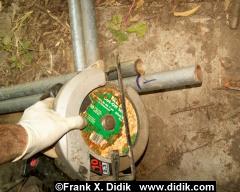
Thin steel tubing was cut with a circular saw and
metal cutting/grinding blade. |
|
|
|
|
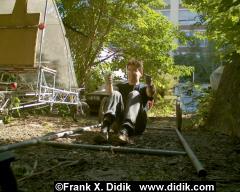
Overall measurements were measured as the vehicle was
being constructed and I used myself as the "model". It
should be noted that I am 6'4" (about 194cm) tall. |
|
|
|
|
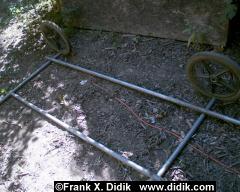
The thin walled steel tubes were laid out, cut and
welded, on the spot, using a low voltage (110volt) inexpensive stick welder. |
|
|
|
|
|
|
|
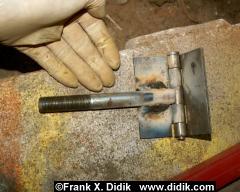
The ball joints are nothing more than heavy duty
welded hinges, |
|
|
|
Everything was simply welded together. The
chases was both welded and bolted for added strength in case the
welds fractured using extra strong 5/8" machine bolts. |
Since the vehicle does not have a suspension
system, I thought that the bolts would provide an extra measure of
safety, though this may not have been necessary.
|
|
|
|
|
The roof/canopy consists of thin, lightweight,
clear plastic that has been treated to minimize the effects of UV light. |
|
|
|
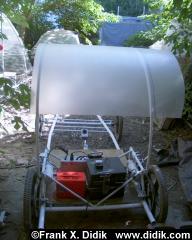
The 4' x 8' thin plastic sheet was laid over the
curved PVC tubes and temporarily held in place using spring loaded clamps. |
|
|
After careful measuring, the plastic sheet was
cut to size using standard tin snips. |
The seat consists of 3/4" plywood covered
with 1" high density foam and covered again with white vinyl leatherette. |
|
The seat material was then stapled to the
wood, using an electric industrial stapler. It could also have just
as easily been nailed using upholstery nails or tacks. |
Since I needed to get the job done quickly, I
worked non-stop till it was finished till the wee hours of the
morning. The Didik Muscle car is seen to the left of the photo. |
|
|
|
|
The plastic roof/canopy was glued to the PVC
tubes using white colored silicon rubber. |
|
The finished vehicle with the protective
translucent film still on the roof/canopy. It was pealed off shortly
after this photo was taken. |
|
|
|




